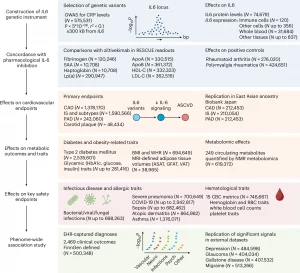Inflammation is central to many diseases, including heart disease. One of the immune system’s key inflammatory signals is interleukin-6 (IL-6), and new research shows that lowering IL-6 activity may help prevent cardiovascular disease, without leaving people more vulnerable to infections (Figure 1).

Figure 1: Study design. The steps of the analytical approach and the samples used. We developed a genetic instrument of IL-6 signaling downregulation consisting of CRP-lowering variants in IL6, demonstrated concordance between its biomarker profile and those observed with IL-6–blocking therapeutics and tested associations with atherosclerotic cardiovascular endpoints, metabolic traits, infectious disease and allergic outcomes and hematological traits, as well as electronic health record (EHR) diagnoses in a PheWAS study.
The study used large-scale human genetic analyses to explore the long-debated link between IL-6 signalling, cardiovascular health, and infection risk. Previous work had looked at IL6R, the gene for the IL-6 receptor, and suggested that blocking it could protect against heart disease. But these studies also hinted at an increased risk of infections, raising concerns about therapies under development that directly target IL-6 itself.
To address this, the team analysed genetic data from over half a million people of European and East Asian ancestry. They specifically focused on variants in the IL6 gene, which directly regulates IL-6 production.
Their findings were striking: people with IL6 variants that lowered IL-6 activity had a reduced lifetime risk of coronary heart disease, stroke, and peripheral artery disease. Even more surprising, these same variants were associated with a lower risk of pneumonia and sepsis, suggesting that suppressing IL-6 does not compromise, and may even enhance, the body’s defence against certain infections.
Beyond cardiovascular health, the analysis hinted at wider benefits. IL-6 inhibition appeared linked to improved lipid profiles and reduced type 2 diabetes risk, pointing to potential metabolic advantages as well.
By combining genetics and epidemiology, this work helps to de-risk therapeutic strategies targeting IL-6. It suggests that dialling down this powerful inflammatory pathway could offer a new, safe, and effective way to reduce the global burden of cardiovascular disease.
Journal article: Zhang L, et al. 2025. IL6 genetic perturbation mimicking IL-6 inhibition is associated with lower cardiometabolic risk. Nat Cardiovasc Re.
Summary by Stefan Botha










